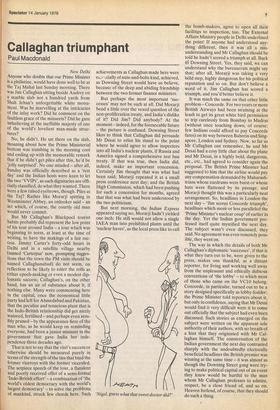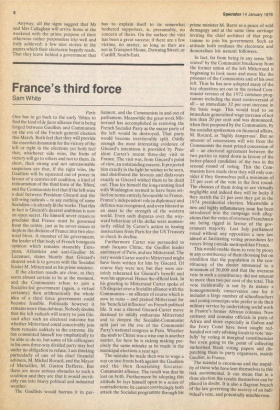Callaghan triumphant
Paul Macdonald
New Delhi Anyone who doubts that our Prime Minister it a philistine, would have done well to be at the Taj Mahal last Sunday morning. There was Jim Callaghan sitting beside Audrey on a marble slab not a hundred yards from Shah Jehan's unforgettable white monument. Was he marvelling at the intricacies of the inlay work? Did he comment on the faultless grace of the minarets? Did he gaze unbelieving at the ineffable majesty of one of the world's loveliest man-made structures?
No, he didn't. He sat there on the slab, moaning about how the Prime Ministerial bottom was numbing in the morning cool and ending up with the memorable remark that if he didn't get piles after this, he'd be lolly surprised'. No one minded — after all, Sunday was officially described as a 'rest day' and the Indian hosts were keen to let the two `VVIPs', as such dignitaries are officially classified, do what they wanted. There were a few raised eyebrows, though. Piles at the Taj? Rather like Morarji spitting in Westminster Abbey, an onlooker said — an act which, of course, the courtly old man would never commit.
But Mr Callaghan's Blackpool tourist habits probably did represent the low point of his tour around India — a tour which was beginning to seem, at least at the time of writing, to have the makings of a fair success. Jimmy Carter's forty-odd hours in Delhi and in a satellite village nearby (named 'Carterpue now, prompting suggestions that the town the PM visits should be named Callaghanabad) do not seem, on reflection to be likely to enter the rolls as either epoch-making or even a modest diplomatic success; Callaghan's, on the other hand, has an air of substance about it, if
nothing else. Many were commenting here in the capital, once the economical little party had left for Ahmedabad and Pakistan, that the peculiar and tenacious plant that is the Indo-British relationship did get nicely watered, fertilised — and perhaps even sensibly pruned — by the appearance Here of the man who, as he would keep on reminding everyone, had been a junior minister in the government that gave India her independence three decades ago.
That is not to say that the visit's success or otherwise should be measured purely in terms of the strength of the ties that bind the former viceroys with the former viceruled. The setpiece speech of the tour, a flatulent and poorly received offer of a semi-formal Indo-British effort' — a combination of 'the world's oldest democracy with the world's largest democracy' — to solve the problems of mankind, struck few chords here. Such achievements as Callaghan made here were eitially of nuts-and-bolts kind, achieved, as Downing Street would have us believe, because of the deep and abiding friendship between the two former finance ministers.
But perhaps the most important 'successes' may not be such at all. Did Morarji bend a little over the vexed question of the non-proliferation treaty, and India's dislike of it? Did Jim? Did anybody? At the moment— indeed, for the foreseeable future — the picture is confused. Downing Street likes to think that Callaghan did persuade Mr Desai to relax his stand to the point where he would agree to allow inspectors into all India's nuclear plants, if Russia and America signed a comprehensive test ban treaty. If that was true, then India did, indeed, make an important concession. Certainly Jim thought that was what had been said; Morarji repeated it at a small press conference next day; and the British High Commission, which had been pushing for such a concession for months, agreed that that was what had been understood by the two politicians.
But next morning, the Indian Express appeared saying no, Morarji hadn't yielded one inch: He still would not allow a single IAEA man into prohibited plants until the 'nuclear haves', as the local press like to call
the bomb-makers, agree to open all their facilities to inspection, too. The External Affairs Ministry people in Delhi underlined the point: If anyone had understood anything different, then it was all a misunderstanding and Mr Callaghan should be told he hadn't scored a triumph at all. Back ti5 Downing Street. Yes, they said, we can understand why the bureaucrats might say that; after all, Morarji was taking a very bold step, highly dangerous for his political reputation and so on. But don't believe a word of it. Jim Callaghan has scored a triumph, and you'd better believe it.
It was much the same on that other little
problem — Concorde. For two years or more British Airways had been straining at the
leash to get its great white bird permission to trip carelessly from Bombay to Madras (without once touching down, of course: few Indians could afford to pay Concorde fares) on its way between Bahrein and Singapore, London and Sydney. Now, so far as Mr Callaghan can remember, he and Mr Desai had a cosy little chat about the plane and Mr Desai, in a highly bold, dangerous, etc., etc., had agreed to consider again the proposal. The British Prime Minister had suggested to him that the airline would pay any compensation demanded by Maharash trians whose eardrums were burst or whose huts were flattened by its passage, and Morarji thought this was a particularly neat arrangement. So, headlines in London the next day — 'Jim scores Concorde triumph', headlines which more or less paralleled the 'Prime Minister's nuclear coup' of earlier in the day. Yet the Indian government pro fessed itself quite mystified the next day. The subject wasn't even discussed, they said. No agreement was even remotely possible, they went on.
The way in which the details of both Mr Callaghan's diplomatic 'successes', if that is what they turn out to be, were given to the press, makes one thankful, as a distant reporter, for living and working well away from the unpleasant and ethically dubious conventions of 'the lobby' — to which most of those who came on the VC10 belong.
Concorde, in particular, turned out to be a story designed specifically as lobby-fodder: the Prime Minister told reporters about it, but only in confidence, saying that Mr Desai would find it very difficult were it to come out officially that the subject had even been discussed. Such stories as emerged on the subject were written on the apparent sole authority of their authors, with no breath of a hint that they originated with Mr Callaghan himself. The consternation of the Indian government the next day contrasted sharply with the undoubtedly electorally beneficial headlines the British premier was winning at the same time — it was almost as though the Downing Street gang were try ing to make political capital out of an event they knew would be hurtful to the man whom Mr Callaghan professes to admire, respect, be a close friend of, and so on. Heaven forfend, of course, that they should do such a thing. Anyway, all the signs suggest that Mr and Mrs Callaghan will arrive home at the weekend with the prime purpose of their otherwise rather purposeless trip well and truly achieved: a few nice stories in the papers which their electorate happily reads. That they leave behind a government that has to explain itself to its somewhat bothered supporters, is, presumably, no concern of theirs. On the surface the visit has been a great success; if there are a few victims, no matter, so long as they are not in Transport House, Downing Street, or Cardiff, South-EaSt.































 Previous page
Previous page